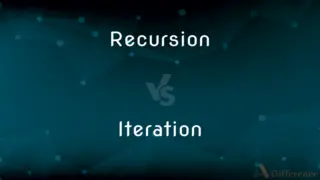Infancy vs. Childhood — What's the Difference?
By Fiza Rafique & Urooj Arif — Updated on April 20, 2024
Infancy is the earliest stage of human development, focusing on basic physical and cognitive growth, while childhood encompasses broader social, emotional, and educational development.

Difference Between Infancy and Childhood
Table of Contents
ADVERTISEMENT
Key Differences
Infancy is the period from birth to around age 2, characterized primarily by rapid physical growth and developmental milestones such as crawling and first words. Whereas, childhood extends from the end of infancy to puberty, marked by advanced cognitive and social skills development.
During infancy, the brain develops at an astonishing rate, laying the foundation for future learning and skills. On the other hand, childhood builds on these neural pathways with complex learning through school education and social interactions.
Infants typically rely heavily on caregivers for basic needs and security. Conversely, children in the childhood stage begin to assert more independence and develop personal interests and friendships.
Infancy is crucial for forming attachment styles that affect later emotional and social development. In contrast, childhood is essential for developing self-esteem and a sense of competence through academic and social achievements.
Health concerns in infancy often revolve around nutrition and milestones, while childhood health expands to include mental health and lifestyle habits.
ADVERTISEMENT
Comparison Chart
Age Range
0-2 years
3-12 years
Development Focus
Physical growth, basic motor skills, sensory acuity
Cognitive, social, and emotional development
Dependency
High dependency on caregivers for basic needs
Developing independence and personal interests
Learning
Non-verbal learning, basic communication
Advanced language skills, formal education
Health Concerns
Nutrition, physical milestones
Mental health, lifestyle habits, physical health
Compare with Definitions
Infancy
A period in human development from birth to around age 2.
Infancy is marked by rapid developmental changes.
Childhood
The state or period of being a child; minor.
His childhood was filled with adventure and learning.
Infancy
The stage of being an infant; early childhood.
During infancy, children experience significant growth spurts.
Childhood
A developmental phase characterized by increasing independence.
During childhood, kids often start to form their own friendships.
Infancy
The earliest phase in the life cycle of humans.
Infancy is crucial for cognitive and physical foundation setting.
Childhood
The span ranging from the end of infancy to the onset of puberty.
Childhood is a critical time for educational development.
Infancy
The beginning or earliest stage of an entity or concept.
The project is still in its infancy and requires careful planning.
Childhood
A time for social and academic growth.
Childhood should be enriched with both play and study.
Infancy
The earliest period of childhood, especially before the ability to walk has been acquired.
Childhood
The time or state of being a child.
Infancy
The state of being an infant.
Childhood
The early stage in the existence or development of something
The childhood of Western civilization.
Infancy
An early stage of existence
Space exploration is still in its infancy.
Childhood
The state of being a child.
Infancy
(Law) The state or period of being a minor.
Childhood
The time during which one is a child, from between infancy and puberty.
Infancy
The earliest period of childhood (crawling rather than walking).
Childhood
(by extension) The early stages of development of something.
Infancy
The state of being an infant.
Childhood
The state of being a child; the time in which persons are children; the condition or time from infancy to puberty.
I have walked before you from my childhood.
Infancy
(figurative) An early stage in the development of anything.
Space tourism is still in its infancy.
Childhood
Children, taken collectively.
The well-governed childhood of this realm.
Infancy
(law) The state of being a minor.
Childhood
The commencement; the first period.
The childhood of our joy.
Infancy
The state or period of being an infant; the first part of life; early childhood.
The babe yet lies in smiling infancy.
Their love in early infancy began.
Childhood
The time of person's life when they are a child
Infancy
The first age of anything; the beginning or early period of existence; as, the infancy of an art.
The infancy and the grandeur of Rome.
Childhood
The state of a child between infancy and adolescence
Infancy
The state or condition of one under age, or under the age of twenty-one years; nonage; minority.
Infancy
The early stage of growth or development
Infancy
The earliest state of immaturity
Common Curiosities
What are the key developmental focuses during infancy?
The key focuses during infancy are physical growth, sensory acuity, and motor skills development.
Why is independence significant in childhood?
Independence in childhood is crucial for developing self-esteem, competence, and personal interests.
What defines infancy in human development?
Infancy is defined as the period from birth to about 2 years of age, focusing on physical and basic cognitive development.
How do childhood learning experiences differ from those in infancy?
Childhood learning involves more complex cognitive processes and formal education, unlike the more sensory-based learning in infancy.
What role do caregivers play during infancy?
Caregivers provide essential care, security, and basic learning opportunities during infancy.
What are common activities for infants?
Common activities for infants include playing with sensory toys, listening to simple songs, and exploring their immediate environment.
How do health concerns differ between infancy and childhood?
Health concerns in infancy typically focus on nutrition and developmental milestones, whereas in childhood, mental health and lifestyle habits become more important.
How do friendships impact development in childhood?
Friendships during childhood play a significant role in social and emotional development.
What educational opportunities are important in childhood?
Formal schooling and extracurricular activities are important educational opportunities in childhood.
How long does childhood last?
Childhood lasts from the end of infancy until puberty, which can start anywhere between ages 9 and 14.
Can the experiences in infancy affect later life?
Yes, experiences during infancy can profoundly impact emotional, social, and cognitive development later in life.
Share Your Discovery

Previous Comparison
Postgraduate vs. Pregraduate
Next Comparison
Squared vs. SquareAuthor Spotlight
Written by
Fiza RafiqueFiza Rafique is a skilled content writer at AskDifference.com, where she meticulously refines and enhances written pieces. Drawing from her vast editorial expertise, Fiza ensures clarity, accuracy, and precision in every article. Passionate about language, she continually seeks to elevate the quality of content for readers worldwide.
Co-written by
Urooj ArifUrooj is a skilled content writer at Ask Difference, known for her exceptional ability to simplify complex topics into engaging and informative content. With a passion for research and a flair for clear, concise writing, she consistently delivers articles that resonate with our diverse audience.
















































